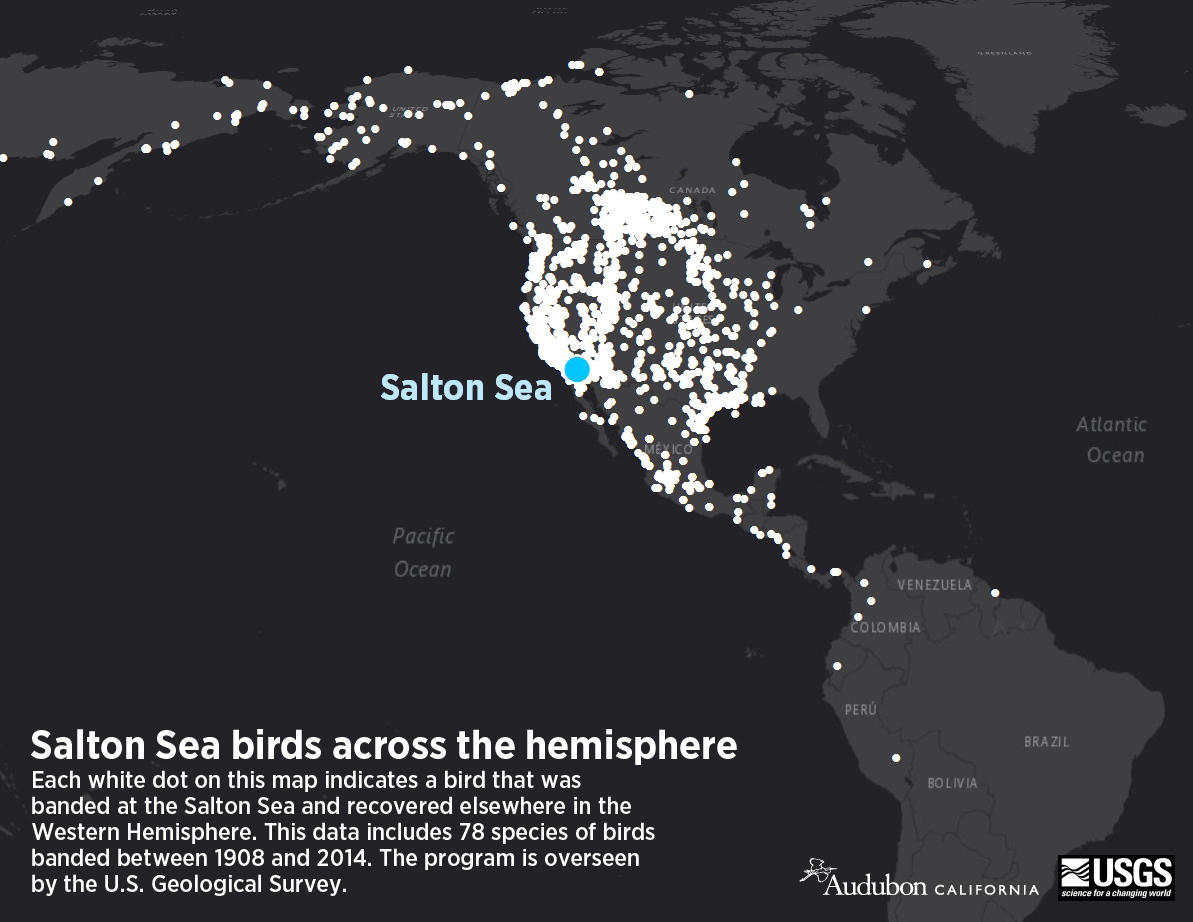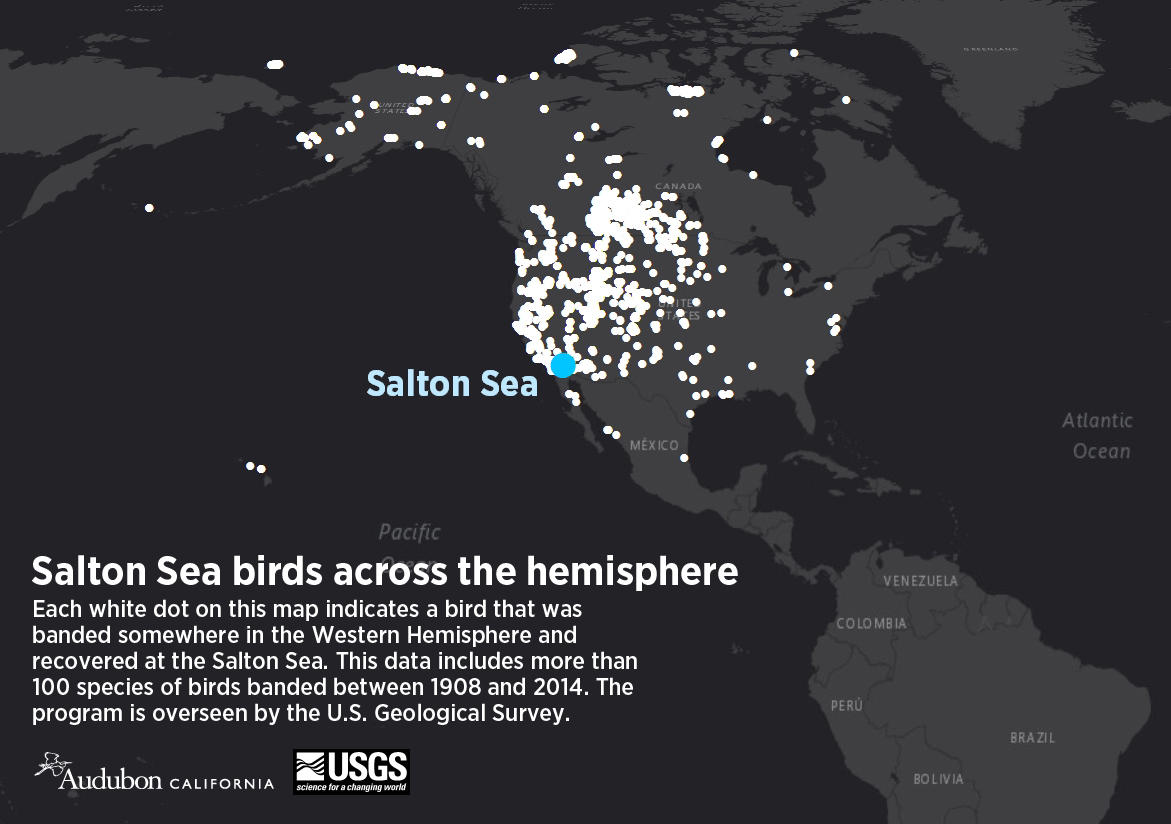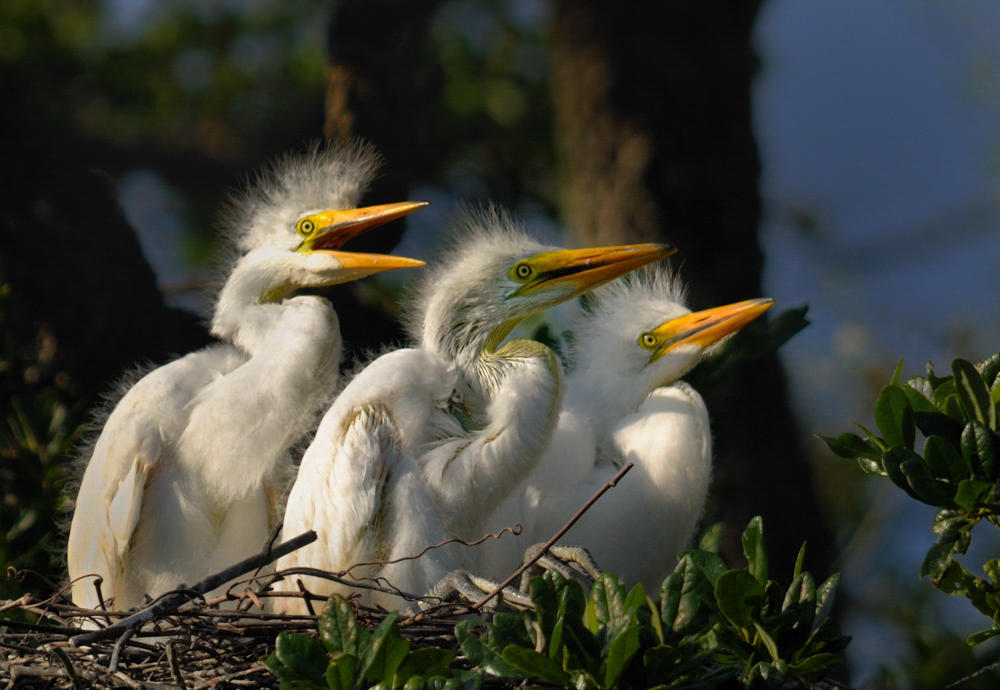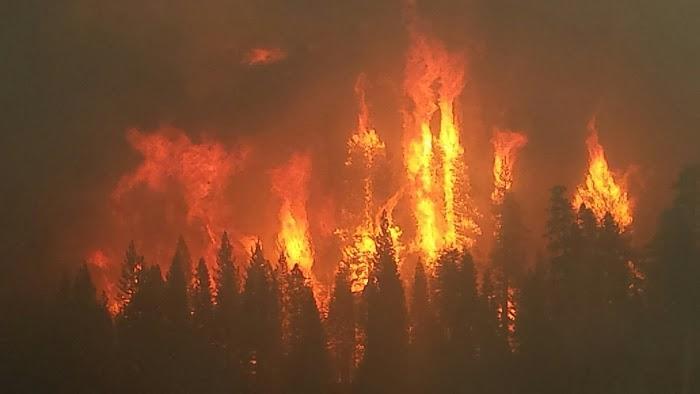Latest News and Updates from Audubon in California
California Condor. Photo: Scott Frier/USFWS
Support Measure AA in San Francisco Bay. This American Avocet wants Bay Area voters to support Measure AA, which will raise $500 million for wetlands restoration throughout San Francisco Bay. Learn more about the measure, and what it means for birds.
When Audubon California talks about the Salton Sea, we often highlight that about 400 species of birds make regular use of this habitat -- massive numbers of sandpipers migrating between Alaska and South America, as much as 90 percent of the world’s Eared Grebes, and large numbers of American White Pelicans, Double-crested Cormorants, the threatened Snowy Plover. Without the Salton Sea, these species and many others would struggle for survival.
The two maps below offer another view of how birds from all over the Western Hemisphere use the Salton Sea. Since 1908, volunteers and researchers have been banding birds for the U.S. Geological Survey's North American Bird Banding Program, and so we have data on where we found birds that were banded at the Salton Sea, as well as where birds were banded that ultimately turned up at the Salton Sea.
Birds banded at the Salton Sea and found elsewhere

Birds banded throughout the Western Hemisphere and found at the Salton Sea


Audubon California sponsored bill, AB 2148, which if passed provides the National Resources Agency the ability to develop regulations regarding drone use on about 1,000,000 acres of publicly managed lands in California in effort to protect nesting birds, passed out of the floor of the State Assembly today with a 51-13 vote. Thank you to everyone who sent an action alert in support.
Here's the first web ad for Measure AA, which will raise $500 million to restore wetlands in San Francisco Bay. Learn more here.
A new study shows that natural land in the American West is diminishing at a faster rate than anyone could have expected:
"From 2001 to 2011, an area totaling 4,321 square miles -- or 15 times the size of San Jose, Oakland and San Francisco combined -- was modified by development in the 11 Western states, the report found, with California losing the most natural land, and Wyoming and Utah changing at the fastest rate.
"We are nibbling away at our wild places at a fairly rapid clip," said Mike Dombeck, former chief of the U.S. Forest Service and the U.S. Bureau of Land Management in the 1990s ...
... Their conclusion: Every 2.5 minutes the West loses an area of natural land the size of a football field to human development. And each year, on average it loses 432 square miles, an area nearly the size of Los Angeles."
The Los Angeles Times' Steve Lopez is really enjoying this whole controversy with the California Coastal Commission. Today, he wonders aloud whether Gov. Brown has noticed anything fishy with his appointed body:
"For months, I’ve been hearing the same question over and over from readers following the ongoing festival of the absurd at the California Coastal Commission. Where in the name of the father, son and holy coast is Gov. Jerry Brown, and why doesn’t he say or do something?
Good question.
Brown’s Coastal Commission is thrashing about, and lawmakers have rushed to the rescue with several reform bills.
But the governor is quieter than a California field mouse."
For its part, Audubon California continues to support a number of bills aimed at reforming the Coastal Commission. Among these are Assembly Bill 2002, which requires lobbyists to adhere to the same regulations as they would when lobbying other public entities; Senate Bill 1190, which would ban all ex parte communication between commissioners and people with business before the Commission; and Assembly Bill 2616, which would add three new seats to the Commission representing communities disproportionately suffering from pollution and other issues of environmental justice.

The U.S. Department of Agriculture is warning of a high risk of intense fires in 2016 thanks to a combination of ongoing drought and a large number of dead trees in the Sierra.
Agriculture Secretary Tom Vilsack said during a briefing on the fire season in Washington, D.C., "“You’ve got 40 million dead trees. You’ve got 40 million opportunities for fire. You’re looking at a very serious situation.”
While fire is a natural occurance in California's open spaces, intense fires can have a number of bad consequences for birds and other wildlife. Not only can large swaths of habitat be wiped out, but the intensity of the blazes can actually cause the habitat to change type -- which leaves little opportunity for native birds to return.
The State of California indicted Plains All-American Pipeline on 46 criminal charges related to last year's oil spill on Refugio State Beach. From The Los Angeles Times:
“This is the first step in holding Plains accountable, and we are committed to putting all the resources that are necessary into seeing this case through,” [State Attorney General Kamala] Harris said at a Santa Barbara news conference.
“In this state, we value our environment, we value our pristine coastal communities, we value the precious wildlife and the oceans that we are proud to call a big part of California. Anyone that violates the law … is going to be held accountable,” she said.
Read more.
The California State Senate last week approved importat climate change legislation that addresses the role that farms and other working lands play in reaching the state's goals for reducing carbon emissions. In particular, Senate Bill 1386 will make it state policy that protecting and managing natural and working lands is key to meeting California’s climate change goals, and directs all relevant state agencies to consider this policy when conducting their work.
Our newsletter is fun way to get our latest stories and important conservation updates from across the state.
Help secure the future for birds at risk from climate change, habitat loss and other threats. Your support will power our science, education, advocacy and on-the-ground conservation efforts.
Join the thousands of Californians that support the proposed Chuckwalla National Monument.